
'Terrorism and cyber criminality call for better international cooperation'
The United States and the European Union need to work together more closely in the field of the law to fight terrorists and criminals who are operating increasingly internationally. This was the advice given by American Minister of Justice Loretta Lynch during her visit to Leiden University on 1 June.
Signing treaties
Lynch is in the Netherlands for the signing of two treaties. One is a Memorandum of Understanding that sets out the legal collaboration between the Netherlands and the United States in the Caribbean region. The other is the Umbrella Data Protection Agreement, in which the EU and the US confirm agreements on the approach to cybercriminality and cybersecurity.
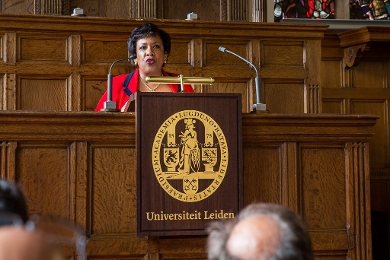
More online criminality
‘The world is more closely interconnected than ever before,' Lynch said during her speech in the Academy Building. Technological innovations mean that geographical borders are becoming blurred and criminals are exploiting online opportunities. The existing legislation has to be modified, according to the American Minister, in order to combat these developments effectively, while at the same time protecting the rights of the individual.
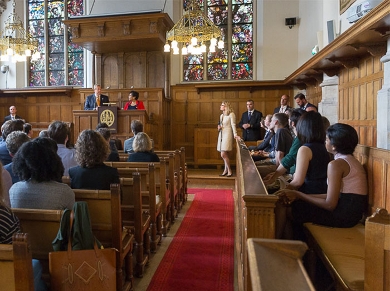
Protecting personal data
As temporary president of the EU, the Netherlands is playing a prominent role in the discussions between the US and the EU. In his speech, Dutch Minister of Justice and Security, Ard van der Steur, emphasised the need to protect personal data and the importance of good collaboration with the US. He talked about how cybercriminals operate in today's world. They live in one country, their internet servers are in a second country and they target victims in a third country. Rapid international cooperation is crucial, but whose responsibility is it to combat these criminals, and how?
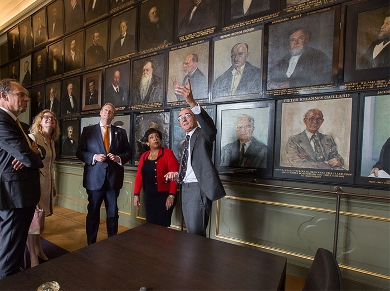
American President studied in Leiden
Both Lynch and Van der Steur drew attention to the long historical links between the US and the Netherlands and Leiden. The sixth American President, John Quincy Adams, even studied in Leiden. Like Hugo de Groot, Lynch remarked, he was the founder of international public law.
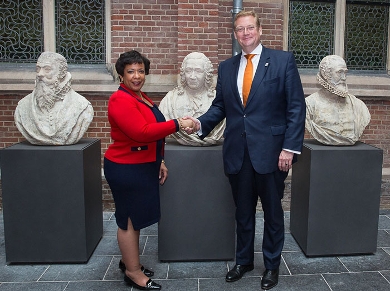
More layered soft drugs policy
After the speeches, both Ministers answered questions from Leiden Law students. One student asked Lynch about the American approach to soft drugs. Lynch explained that several states currently tolerate the use of soft drugs, for medicinal purposes and for modest recreational consumption. ‘Rather than hitting everyone equally hard, we are now moving towards a more layered policy, with different levels.' The use of soft drugs is treated less as a serious crime, and more priority is given to the major drugs criminals and hard drugs addicts.
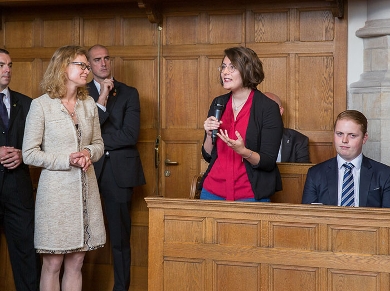
Death penalty
The differences between the American states were also the subject of a question on the death penalty. Lynch was cautious with her response: because the States has a system of federal government, the opportunities for central government to intervene are limited. 'Calling for the death penalty is one of the most difficult decisions a prosecutor has to make. Not all states have the death penalty and in those that do have capital punishment, it is now being applied much less often.' The Minister explained that the death penalty is currently under debate and that a number of different states are carrying out an analysis of the whole penal process in order to exclude the possibility of errors.
Limitations of bilateral collaboration
In response to a question about the limitations of bilateral collaboration, both Ministers were diplomatic with their replies. Lynch: 'If there are differences of opinion, we discuss them and come to a result. The US doesn't always have the answer to all the questions. There are times when we have to adapt our laws in order to make collaboration possible.' Van der Steur gave the example of combating terrorism. Following the attacks in New York in 2001, the US urgently built a more efficient information system to track terrorists. Europe lagged behind. But since the attacks in Paris, a better information system for Europe has been a high-priority issue. 'In all honesty, that's something we learned from the US.'
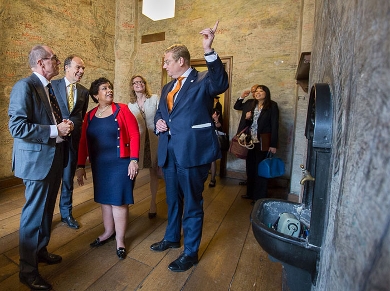
(Photos: Monique Shaw)
